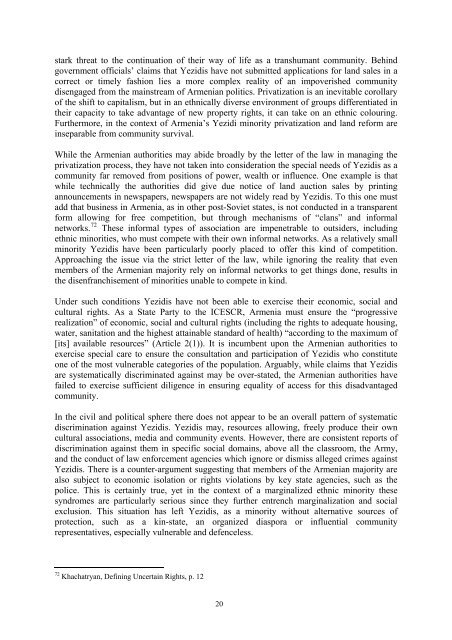The Human Rights situation of the Yezidi minority - UNHCR
The Human Rights situation of the Yezidi minority - UNHCR
The Human Rights situation of the Yezidi minority - UNHCR
You also want an ePaper? Increase the reach of your titles
YUMPU automatically turns print PDFs into web optimized ePapers that Google loves.
stark threat to <strong>the</strong> continuation <strong>of</strong> <strong>the</strong>ir way <strong>of</strong> life as a transhumant community. Behind<br />
government <strong>of</strong>ficials’ claims that <strong>Yezidi</strong>s have not submitted applications for land sales in a<br />
correct or timely fashion lies a more complex reality <strong>of</strong> an impoverished community<br />
disengaged from <strong>the</strong> mainstream <strong>of</strong> Armenian politics. Privatization is an inevitable corollary<br />
<strong>of</strong> <strong>the</strong> shift to capitalism, but in an ethnically diverse environment <strong>of</strong> groups differentiated in<br />
<strong>the</strong>ir capacity to take advantage <strong>of</strong> new property rights, it can take on an ethnic colouring.<br />
Fur<strong>the</strong>rmore, in <strong>the</strong> context <strong>of</strong> Armenia’s <strong>Yezidi</strong> <strong>minority</strong> privatization and land reform are<br />
inseparable from community survival.<br />
While <strong>the</strong> Armenian authorities may abide broadly by <strong>the</strong> letter <strong>of</strong> <strong>the</strong> law in managing <strong>the</strong><br />
privatization process, <strong>the</strong>y have not taken into consideration <strong>the</strong> special needs <strong>of</strong> <strong>Yezidi</strong>s as a<br />
community far removed from positions <strong>of</strong> power, wealth or influence. One example is that<br />
while technically <strong>the</strong> authorities did give due notice <strong>of</strong> land auction sales by printing<br />
announcements in newspapers, newspapers are not widely read by <strong>Yezidi</strong>s. To this one must<br />
add that business in Armenia, as in o<strong>the</strong>r post-Soviet states, is not conducted in a transparent<br />
form allowing for free competition, but through mechanisms <strong>of</strong> “clans” and informal<br />
networks. 72 <strong>The</strong>se informal types <strong>of</strong> association are impenetrable to outsiders, including<br />
ethnic minorities, who must compete with <strong>the</strong>ir own informal networks. As a relatively small<br />
<strong>minority</strong> <strong>Yezidi</strong>s have been particularly poorly placed to <strong>of</strong>fer this kind <strong>of</strong> competition.<br />
Approaching <strong>the</strong> issue via <strong>the</strong> strict letter <strong>of</strong> <strong>the</strong> law, while ignoring <strong>the</strong> reality that even<br />
members <strong>of</strong> <strong>the</strong> Armenian majority rely on informal networks to get things done, results in<br />
<strong>the</strong> disenfranchisement <strong>of</strong> minorities unable to compete in kind.<br />
Under such conditions <strong>Yezidi</strong>s have not been able to exercise <strong>the</strong>ir economic, social and<br />
cultural rights. As a State Party to <strong>the</strong> ICESCR, Armenia must ensure <strong>the</strong> “progressive<br />
realization” <strong>of</strong> economic, social and cultural rights (including <strong>the</strong> rights to adequate housing,<br />
water, sanitation and <strong>the</strong> highest attainable standard <strong>of</strong> health) “according to <strong>the</strong> maximum <strong>of</strong><br />
[its] available resources” (Article 2(1)). It is incumbent upon <strong>the</strong> Armenian authorities to<br />
exercise special care to ensure <strong>the</strong> consultation and participation <strong>of</strong> <strong>Yezidi</strong>s who constitute<br />
one <strong>of</strong> <strong>the</strong> most vulnerable categories <strong>of</strong> <strong>the</strong> population. Arguably, while claims that <strong>Yezidi</strong>s<br />
are systematically discriminated against may be over-stated, <strong>the</strong> Armenian authorities have<br />
failed to exercise sufficient diligence in ensuring equality <strong>of</strong> access for this disadvantaged<br />
community.<br />
In <strong>the</strong> civil and political sphere <strong>the</strong>re does not appear to be an overall pattern <strong>of</strong> systematic<br />
discrimination against <strong>Yezidi</strong>s. <strong>Yezidi</strong>s may, resources allowing, freely produce <strong>the</strong>ir own<br />
cultural associations, media and community events. However, <strong>the</strong>re are consistent reports <strong>of</strong><br />
discrimination against <strong>the</strong>m in specific social domains, above all <strong>the</strong> classroom, <strong>the</strong> Army,<br />
and <strong>the</strong> conduct <strong>of</strong> law enforcement agencies which ignore or dismiss alleged crimes against<br />
<strong>Yezidi</strong>s. <strong>The</strong>re is a counter-argument suggesting that members <strong>of</strong> <strong>the</strong> Armenian majority are<br />
also subject to economic isolation or rights violations by key state agencies, such as <strong>the</strong><br />
police. This is certainly true, yet in <strong>the</strong> context <strong>of</strong> a marginalized ethnic <strong>minority</strong> <strong>the</strong>se<br />
syndromes are particularly serious since <strong>the</strong>y fur<strong>the</strong>r entrench marginalization and social<br />
exclusion. This <strong>situation</strong> has left <strong>Yezidi</strong>s, as a <strong>minority</strong> without alternative sources <strong>of</strong><br />
protection, such as a kin-state, an organized diaspora or influential community<br />
representatives, especially vulnerable and defenceless.<br />
72 Khachatryan, Defining Uncertain <strong>Rights</strong>, p. 12<br />
20
















